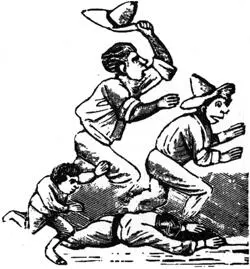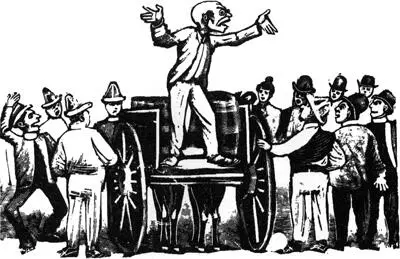And he told the journalist confidentially: “Once the elections are over, we’ll sic the police on the strikers.”
But there was a mix-up. This private chat was picked up by satellite and transmitted to every parabolic antenna in Brazil. The words of the minister were broadcast throughout the country. On that historic occasion, Brazilians heard the truth. For once, and by mistake, they heard the truth.
Afterward, the minister didn’t crawl the path of Saint James on his knees or flagellate himself or throw ash on his head; nor did he seek refuge in the heights of the Himalayas. Rubens Ricupero became secretary-general of the United Nations Conference on Trade and Development (UNCTAD).
Money isn’t all they steal. Sometimes they steal elections too, as occurred in Mexico in 1988, when the presidency was snatched away from the left-wing opposition candidate, Cuauhtémoc Cárdenas, who had won a majority at the polls. Years later, in 1997, several legislators from the governing party accused the leader of the right-wing opposition, Diego Fernández de Cevallos, of receiving fourteen million dollars in return for his complicity in that electoral fraud. The press had a field day because an exchange of blows turned the parliamentary session into a boxing match, and the accusation of bribery got a lot of publicity. But passed over as hardly worth mentioning was something much more serious: the accusation itself was an implicit confession of electoral fraud by congressmen from the party that had committed it.
The greatest crimes are on the order of bad habits considered normal. While democracy gets besmirched, the ethic of anything goes is embraced: no one succeeds by pissing holy water. How many North Americans believe their senators have “very high morals”? All of 2 percent. At the end of 1996, the Buenos Aires daily Página 12 published a Gallup poll: seven of every ten Argentine youth claimed that dishonesty is the only way to succeed. And of all those polled, young and old, nine out of ten acknowledged that evading taxes and bribing officials or the police are common practices.


What is rewarded above is punished below. Petty robbery is a crime against property; grand larceny is a property owner’s right. Unscrupulous politicians do no more than act in accordance with a system where success justifies the means that make it possible, dirty as they may be: cheating the tax man and your neighbor, falsifying accounts, hiding assets, looting companies, inventing fictitious enterprises, underbilling, overbilling, fraudulent commissions …
THE POWER OF KIDNAPPERS
According to the dictionary, “kidnap” means to hold someone illegally in order to obtain a ransom. The crime draws a stiff sentence in every penal code, but no one would dream of jailing the financial bigwigs who hold countries hostage and, delightfully immune to consequences, collect fabulous ransoms day after day.
Exemplary Lives/2
At the end of the eighties, all young men in Spain wanted to be like him. The polls agreed: this star from Spain’s financial world, this King Midas of the banks, had eclipsed El Cid and Don Quixote as the model of choice for generations to come. An acrobat who did high jumps up the social ladder, this native of a little town in Galicia had reached the summits of power and success. The readers of romance magazines showered him with praise, calling him the most attractive man in Spain, the most marriageable. Always smiling, every hair in place, he looked fresh from the dry cleaners whether they photographed him reading spreadsheets, dancing sevillanas, or yachting in the Mediterranean. “I Want to Be Mario Conde” was the name of a hit song.
In 1997, the prosecutor demanded forty-four years for Mario Conde, not much for the man who masterminded the greatest financial swindle in the history of Spain.
In the olden days, the marines would take over the customs houses in Central America and the islands of the Caribbean to collect the debts those countries owed. The U.S. occupation of Haiti lasted nineteen years, from 1915 to 1934. The invaders did not leave until Citibank had collected on all its loans, multiplied several times over by usurious interest rates. In their place, the marines left a national army created to prop up the dictatorship and keep the payments flowing. Today, in these democratic times, international technocrats are more effective than military expeditions. The Haitian people did not elect, did not even cast a single vote for, the directors of the International Monetary Fund or the World Bank, but that’s who decides the fate of every dollar that enters Haiti’s public coffers. As in all other poor countries, more powerful than the vote is the veto: the democratic vote proposes and the financial veto disposes.
The Monetary Fund is called International, just as the Bank is called World, but these twin brothers live, collect, and decide in Washington, and their well-populated technocracy never spits in the plate from which they eat. Although the United States is by far the most indebted country in the world, no outsider orders it to put a FOR SALE sign on the White House; such an act of insolence would never occur to any international bureaucrat. In contrast, the countries of the South, which service their debts at the rate of $250,000 per minute, are captives, and creditors cut their sovereignty to ribbons just as Roman patricians in previous imperial times cut their plebeian debtors to ribbons in the public plaza. No matter how much these countries pay, there is no way to quench the thirst of that huge leaky jug called the foreign debt. The more they pay, the more they owe; and the more they owe, the more they are obliged to obey orders to dismantle the state, mortgage their political independence, and alienate the national economy. “He lived paying and he died owing” could be written on their gravestones.
Saint Hedwig, patron saint of the indebted, is the saint who garners the most prayers in Brazil. Thousands upon thousands of desperate debtors make their pilgrimage to her, pleading for her to keep creditors from taking away their televisions, cars, or homes. Sometimes Saint Hedwig performs a miracle. But how can the saint help countries when creditors have already carted off the government, countries free to do whatever they’re told by faceless, far-off men who practice financial blackmail by remote control? Creditors open and close stock exchanges, depending on the degree of submissiveness to the “right economic track.” The one and only truth is imposed with a fanaticism worthy of the Inquisition, single-party commissars, or Islamic fundamentalists; exactly the same policy is dictated to countries as diverse as Bolivia and Russia, Mongolia and Nigeria, South Korea and Mexico.

At the end of 1997, Michel Camdessus, president of the International Monetary Fund, declared: “The state should not give orders to the banks.” Translated, this means: “It’s the banks who ought to give orders to the state.” Nearly two years earlier, German banker Hans Tietmeyer, president of the Bundesbank, put it this way: “Financial markets more and more play the role of gendarmes. Politicians should understand that from now on they are under the control of financial markets.” Brazilian sociologist Hebert de Souza, “Betinho,” once suggested sending all the presidents off on a luxury cruise. Governments govern less and less, and the people who voted for them feel less and less represented by them. Polls reveal this lack of faith: fewer than half of all Brazilians and just over half of all Chileans, Mexicans, Paraguayans, and Peruvians believe in democracy. In the 1997 legislative elections, Chile recorded the largest number of blank ballots in the country’s history. And never have so many young people not bothered to register to vote.
Читать дальше














